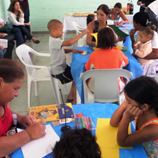 30 August 2013 - UNODC's Office in Brazil launched a pilot project this week together with the Federal Government to promote protective family relationships. Research has shown that families can either act as a powerful risk or a protective factor in child and youth development. Focusing on family skills is therefore key to preventing children and adolescents from using drugs, getting involved in crime and becoming vulnerable to HIV/AIDS.
30 August 2013 - UNODC's Office in Brazil launched a pilot project this week together with the Federal Government to promote protective family relationships. Research has shown that families can either act as a powerful risk or a protective factor in child and youth development. Focusing on family skills is therefore key to preventing children and adolescents from using drugs, getting involved in crime and becoming vulnerable to HIV/AIDS.
Launched in Brasilia this week, the project kicked-started with a week-long training of around 100 social workers, teachers, psychologists and community leaders, who will impart their newly gained knowledge and skills in their immediate environment.
Speaking at the launch event, Brazil's National Secretary for Drug Policy Vitore Maximiano said: "This programme for strengthening the relationship between parents and children, even from the very young age of zero to five years old, is absolutely innovative. It is something we want to take to several other locations in the country."
Supporting parents in taking better care of their children has proven to be an effective strategy to prevent drug use and a range of risky and problematic behaviours. Secure and healthy relationships, parental supervision and setting age-appropriate limits, as well as an organized family environment, help protect children and youth from drug use and contribute to their capacity to overcome hardship and achieve positive outcomes in life. Conversely, indifferent child-parent relationships and chaotic home environments increase the risk of children and youth initiating drug use or engaging in other dangerous behaviour.
The pilot project is the result of a partnership between UNODC, the National Secretariat for Drug Policy (SENAD), the State Secretariat of Justice (SEJUS) and the State Secretariat of Social Development and Income Transfer (SEDEST). Up to 130 families will directly benefit from it in the next two months.
The Brazilian project is part of UNODC's global effort to promote evidence-based family skills programmes targeting parents and their children, with projects reaching out to 5,000 families in 20 countries in Central Asia, Central America and Southeast Europe. Results gathered from such programmes show positive results: increased social skills and improved academic performance in children and greater parent involvement in schools, as well as a decrease in conflict and aggressive behaviour and anxiety.